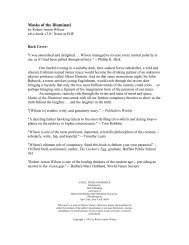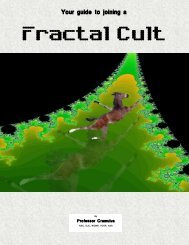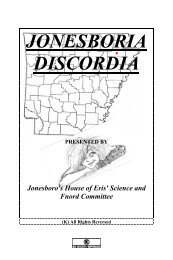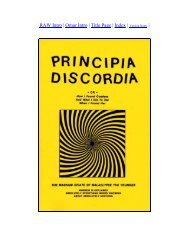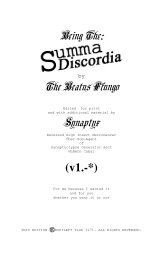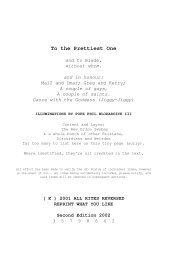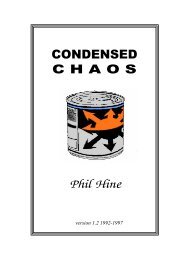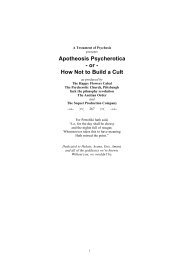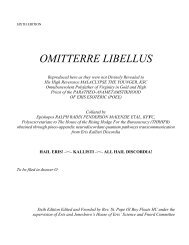Coincidance - Principia Discordia
Coincidance - Principia Discordia
Coincidance - Principia Discordia
You also want an ePaper? Increase the reach of your titles
YUMPU automatically turns print PDFs into web optimized ePapers that Google loves.
COINCIDANCE 69<br />
Would you regard it as a monstrous satirical exaggeration on my part or<br />
a mere statement of anthropological fact, if I assert that art criticism is the<br />
only pplace in the modern world, outside the Vatican, where medieval<br />
metaphysics (the Aristotelian absolute "is") still flourishes?<br />
All recent psychotherapy places great emphasis on "taking responsibility."<br />
Can this be done, at all, if meanings are "outside" and have absolute is-ness?<br />
Is "responsibility" possible at all, before one realizes that meaning is not in<br />
events but in the evaluations of the nervous system?<br />
Van Gogh could see 28 shades of black. Why?<br />
"The greatest progress that human race has made lies in learning how to make<br />
correct inferences."<br />
—Nietzsche, Human, All-Too-Human<br />
I used to own what was called The Uncritical Inference Test; I used it in all<br />
my seminars. Somewhere I lost it, and I don't know where to buy another one.<br />
In this test, you see one inference at a time, and cannot go back and<br />
correct the early ones. It always astounds me how many uncritical or<br />
incorrect inferences are made by even allegedly educated people.<br />
Adapting from memory, here is part of one section of that Test: A<br />
doctor's car is parked in front of 2 Elm Street. Which of the following<br />
inferences are correct?<br />
1) Somebody is ill in 2 Elm Street. 2) The doctor lives at 2 Elm Street. 3)<br />
The doctor parked there before he could find a better parking place. 4) The<br />
doctor, whoever he or she is, is somewhere in the neighborhood. 5)<br />
Somebody stole the doctor's car and dumped it there.<br />
It is amazing how many people will check all of these, even though they<br />
wish they could go back and uncheck the earlier ones. Of course, all the<br />
inferences are uncritical; one cannot be sure of anything, except that the car<br />
is parked there.<br />
In As I lay Dying (Faulkner) black people are always referred to as "niggers."<br />
A) This proves Faulkner was a racist. B) This proves Faulkner was being<br />
accurate in representing the language of his narrators (Mississippi poor<br />
whites). In The Town (Faulkner) both "nigger" and "Negro" appear. A)<br />
Faulkner was recovering from his racism. B) Faulkner was indicating<br />
different speech patterns of different classes in Mississippi. (Are these<br />
alternative inferences certain or only more-or-less probable?) (Both books<br />
were written before "Black" became fashionable.)<br />
It is a well-known idea, not just among "mystics," but among modern




